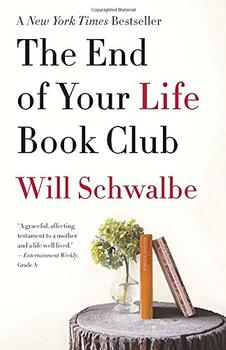Summary | Excerpt | Reading Guide | Discuss | Reviews | Beyond the Book | Readalikes | Genres & Themes | Author Bio

Crossing to Safety
We were nuts about the mocha in the waiting room at Memorial Sloan-Kettering's outpatient care center. The coffee isn't so good, and the hot chocolate is worse. But if, as Mom and I discovered, you push the"mocha" button, you see how two not-very-good things can come together to make something quite delicious. The graham crackers aren't bad either.
The outpatient care center is housed on the very pleasant fourth floor of a handsome black steel and glass office building in Manhattan on the corner of 53rd Street and Third Avenue. Its visitors are fortunate that it's so pleasant, because they spend many hours there. This is where people with cancer wait to see their doctors and to be hooked up to a drip for doses of the life-prolonging poison that is one of the wonders of the modern medical world. By the late autumn of 2007, my mother and I began meeting there regularly.
Our book club got its formal start with the mocha and one of the most casual questions two people can ask each other:"What are you reading?" It's something of a quaint question these days. More often in lulls of conversation people ask,"What movies have you seen?" or"Where are you going on vacation?" You can no longer assume, the way you could when I was growing up, that anyone is reading anything. But it's a question my mother and I asked each other for as long as I can remember. So one November day, while passing the time between when they took Mom's blood and when she saw the doctor (which preceded the chemo), I threw out that question. Mom answered that she was reading an extraordinary book, Crossing to Safety by Wallace Stegner.
Crossing to Safety, which was first published in 1987, is one of those books I'd always so intended to read that I spent years pretending not only that I'd actually read it but also that I knew more about its author than that he'd been born in the early years of the twentieth century and wrote mostly about the American West. I worked in book publishing for twenty-one years and, in various conversation lulls, got into the habit of asking people, especially booksellers, the name of their favorite book and why they loved it so much. One of the most frequently named books was and is always Crossing to Safety.
Raving about books I hadn't read yet was part of my job. But there's a difference between casually fibbing to a bookseller and lying to your seventy-three-year-old mother when you are accompanying her for treatments to slow the growth of a cancer that had already spread from her pancreas to her liver by the time it was diagnosed.
I confessed that I had not, in fact, read this book.
"I'll give you my copy when I'm finished," said my mother, who was always much thriftier than I am.
"That's okay, I have a copy," I told her, which was, in fact, true. There are certain books that I mean to read and keep stacked by my bedside. I even take them on trips. Some of my books should be awarded their own frequentflier miles, they've traveled so much. I take these volumes on flight after flight with the best of intentions and then wind up reading anything and everything else (SkyMall! Golf Digest!). I'd brought Crossing to Safety on so many trips and returned it to my bedside unread so many times that it could have earned at least one firstclass ticket to Tokyo on Japan Airlines.
But this time it would be different. That weekend I started it, and then, at about page twenty or so, the magical thing occurred that happens only with the very best books: I became absorbed and obsessed and entered the"Can't you see I'm reading?" mode. For those of you who haven't read Crossing to Safety (or are still pretending to have read it), it's a story about the lifelong friendship of two couples: Sid and Charity, and Larry and Sally. At the start of the novel, Charity is dying of cancer. So once I read it, it was natural that I would want to talk about it with Mom. The novel gave us a way to discuss some of the things she was facing and some of the things I was facing.
Excerpted from The End of Your Life Book Club by Will Schwalbe. Copyright © 2012 by Will Schwalbe. Excerpted by permission of Knopf. All rights reserved. No part of this excerpt may be reproduced or reprinted without permission in writing from the publisher.
Your guide toexceptional books
BookBrowse seeks out and recommends the best in contemporary fiction and nonfiction—books that not only engage and entertain but also deepen our understanding of ourselves and the world around us.